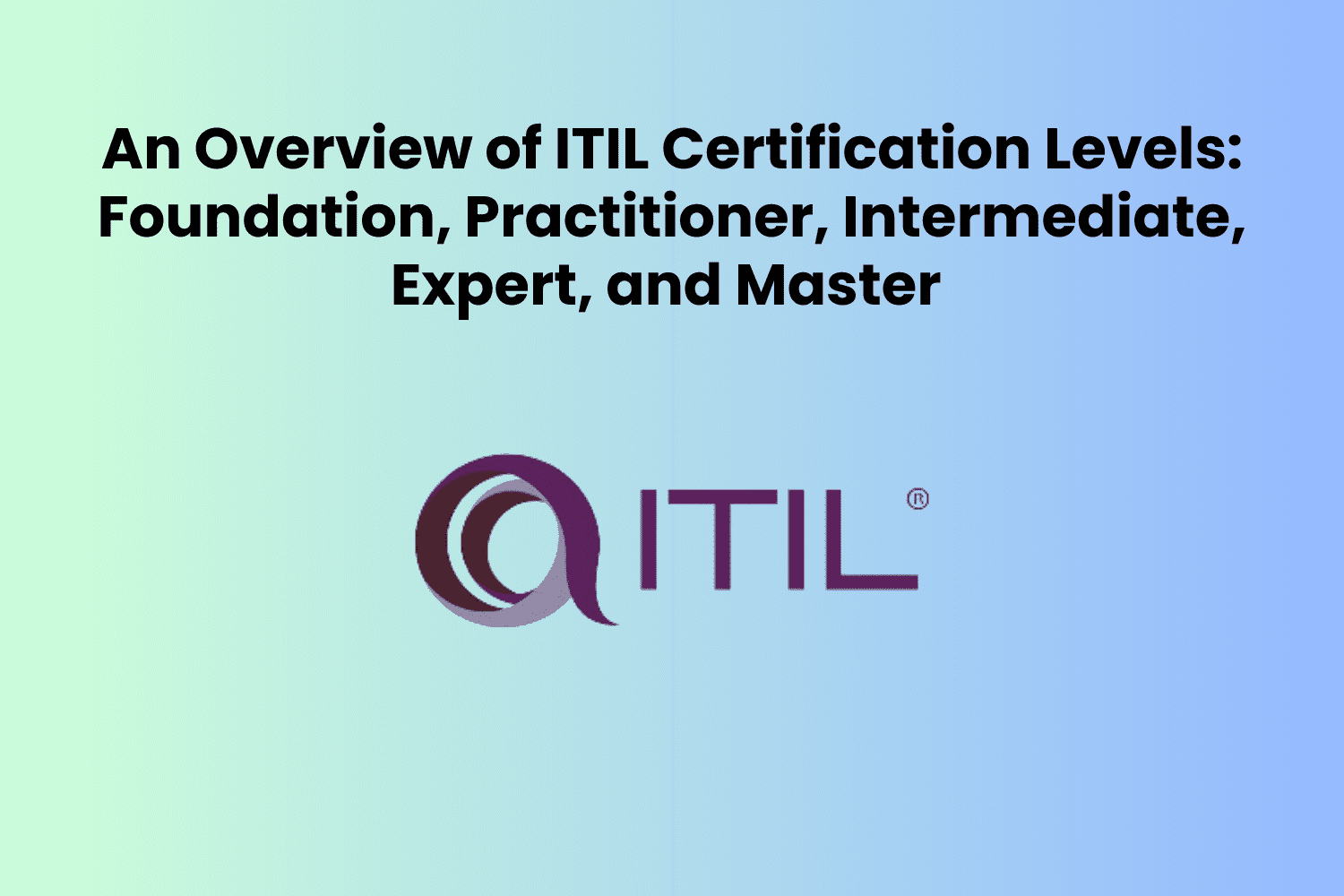In Information Technology (IT) Service Management, professionals continually seek to distinguish themselves through certifications that validate their expertise and knowledge. ITIL Certification Levels stands out as a leading framework designed to standardise the selection, planning, delivery, and support of IT services to businesses.
The question, What is ITIL, unfolds an answer that reveals a comprehensive suite of best practices intended to facilitate the efficient and effective management of IT services, aligning them closely with the needs of the business. This blog provides a comprehensive guide to ITIL certification levels, including Foundation, Practitioner, Intermediate, Expert, and Master, helping IT professionals excel in IT service management.
ITIL Certification: Foundation Level
The journey into ITIL certifications begins at the Foundation level. This certification provides an overview of ITIL framework, focusing on key elements, concepts, and terminology in service lifecycle management.
The Foundation level is designed for individuals who want to gain a basic understanding of ITIL and how it can enhance the quality of IT service management within an organization. It is suitable for IT professionals, business managers, and business process owners.
Learning Objectives
- Learn about the five stages of the ITIL service lifecycle: service strategy, service design, service transition, service operation, and continuous service improvement.
- Grasping the principles and processes involved in ITIL service management.
- Recognising the importance of IT and business integration.
ITIL Certification levels: Practitioner Level
The Practitioner level is the next step in the ITIL certification pathway, designed for those who have already achieved the Foundation certificate. This level focuses on the practical application of ITIL knowledge in the real world, enabling professionals to adopt and adapt ITIL guidance to their organisation’s specific needs. The Practitioner level emphasises the importance of change management, communication, measurement, and metrics within the ITIL framework.
Learning Objectives:
- Applying ITIL guidance to improve service management.
- Understanding and utilising the Continual Service Improvement (CSI) approach.
- Enhancing skills in change management, communication, and measurement.
ITIL Certification: Intermediate Level
The Intermediate level offers a modular approach, allowing professionals to specialise in areas of ITIL that are most relevant to their role and the needs of their organisation. The Intermediate level is divided into Service Lifecycle and Service Capability.
Service Lifecycle Modules:
- Service Strategy (SS)
- Service Design (SD)
- Service Transition (ST)
- Service Operation (SO)
- Continual Service Improvement (CSI)
Service Capability Modules:
- Operational Support and Analysis (OSA)
- Planning, Protection, and Optimisation (PPO)
- Release, Control, and Validation (RCV)
- Service Offerings and Agreements (SOA)
Each module provides a deep dive into the specific aspects of ITIL service management, allowing for a more detailed understanding and expertise in the respective areas.
ITIL Certification levels: Expert Level
The Expert level is aimed at individuals who want to demonstrate a superior understanding of the entire ITIL scheme. To achieve the ITIL Expert certification, one must accumulate specific credits through the Foundation, Practitioner, and Intermediate levels and pass the Managing Across the Lifecycle (MALC) module.
This level consolidates the knowledge and skills acquired at the previous levels, providing a comprehensive understanding of the ITIL best practice guidance.
Learning Objectives:
- Mastery of ITIL best practices across all aspects of IT service management.
- Ability to manage and integrate ITIL processes across the lifecycle.
- Strategic leadership skills to guide an organization in implementing ITIL practices.
ITIL Certification levels: Master Level
The pinnacle of ITIL certification levels, the Master level, is for those who wish to demonstrate their ability to apply the ITIL framework in a real-world context. To achieve the ITIL Master certification, candidates must have the ITIL Expert certification and extensive practical experience with ITIL. Candidates must submit a proposal for a real-life project and defend their project and its application of ITIL principles before a panel of experts.
Learning Objectives:
- Demonstrating a complete mastery of ITIL practices and their application in a real-world setting.
- Leadership in developing and implementing IT service management strategies that align with organizational goals.
- Innovating and adapting ITIL framework practices to meet specific organizational needs.
Conclusion
The ITIL Certification levels pathway offers IT professionals a structured approach to mastering the principles and practices of IT service management. From the foundational understanding of the ITIL framework to the advanced application and strategic leadership at the Master level, ITIL certifications levels equip individuals with the skills needed to improve IT service management within their organisations. As businesses continue to rely heavily on IT for their operations and growth, the demand for ITIL-certified professionals is expected to remain strong.
